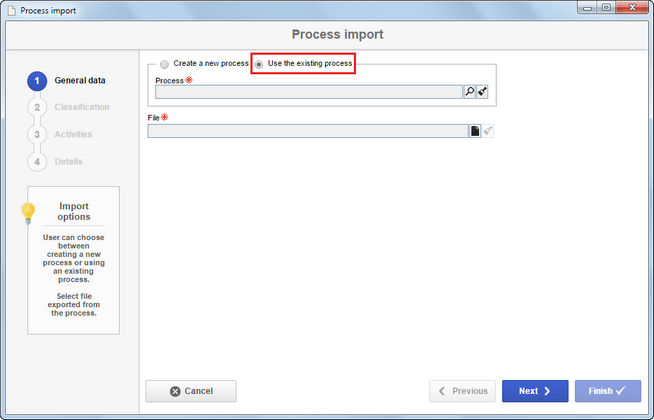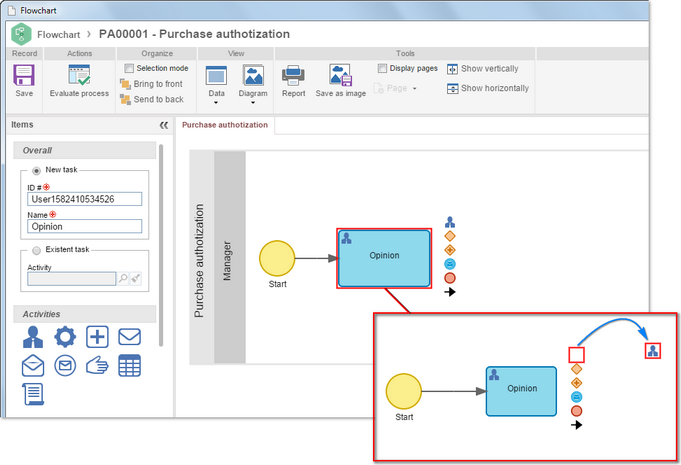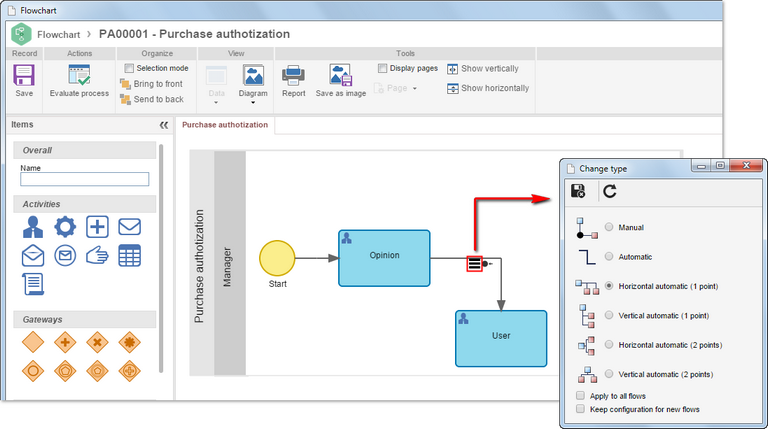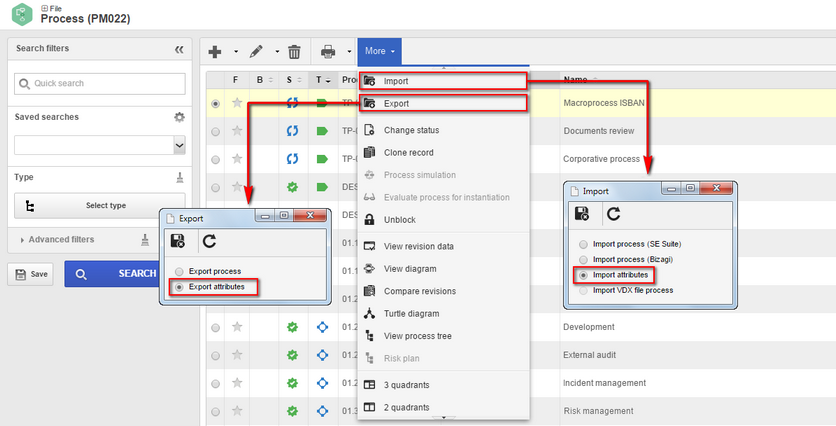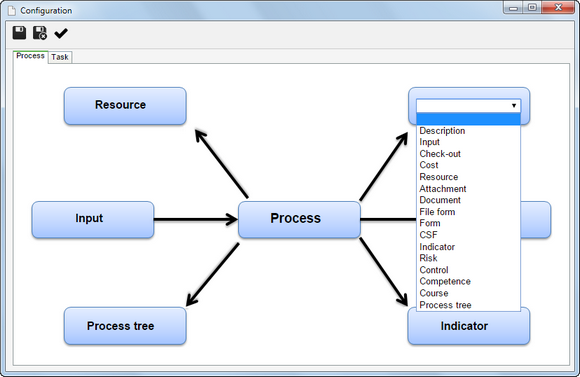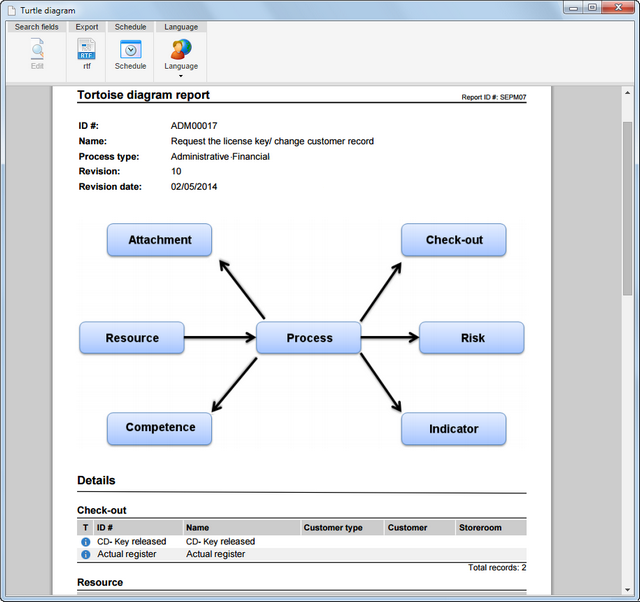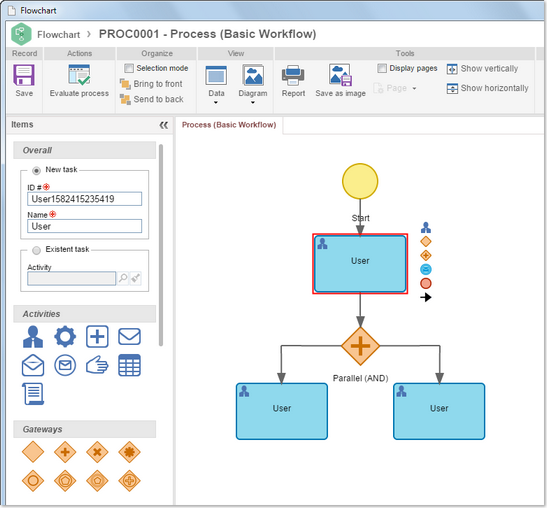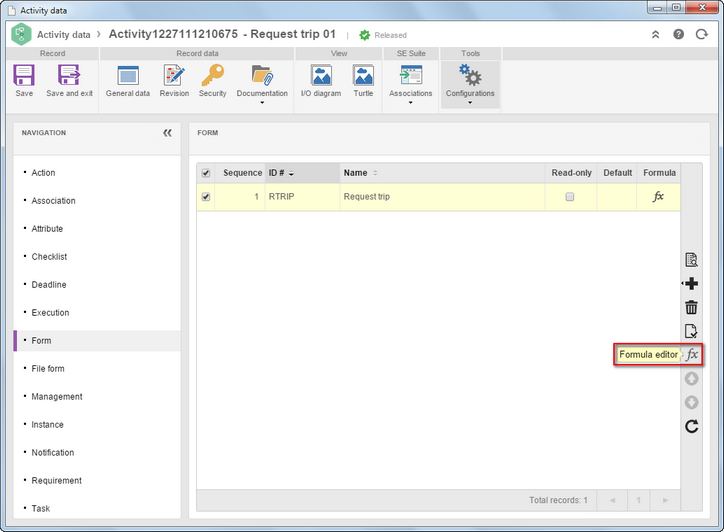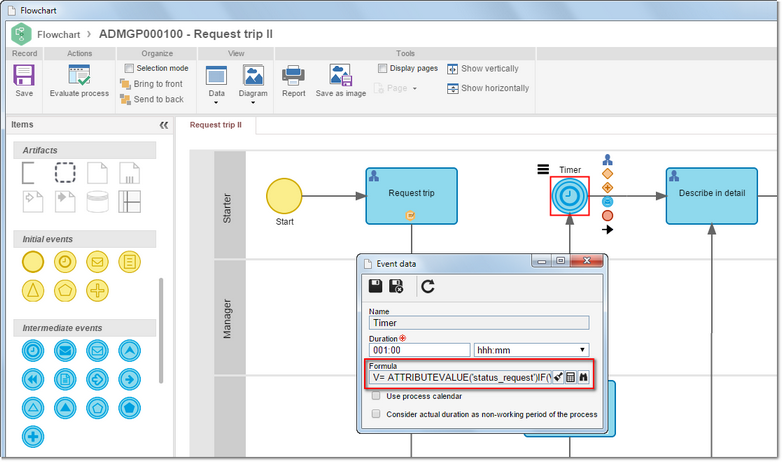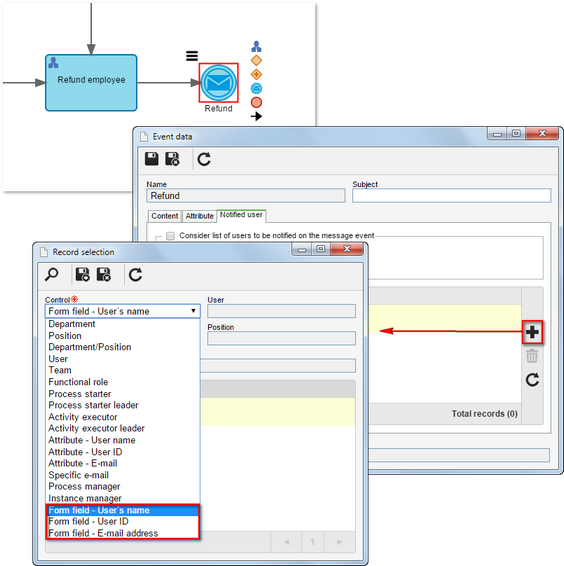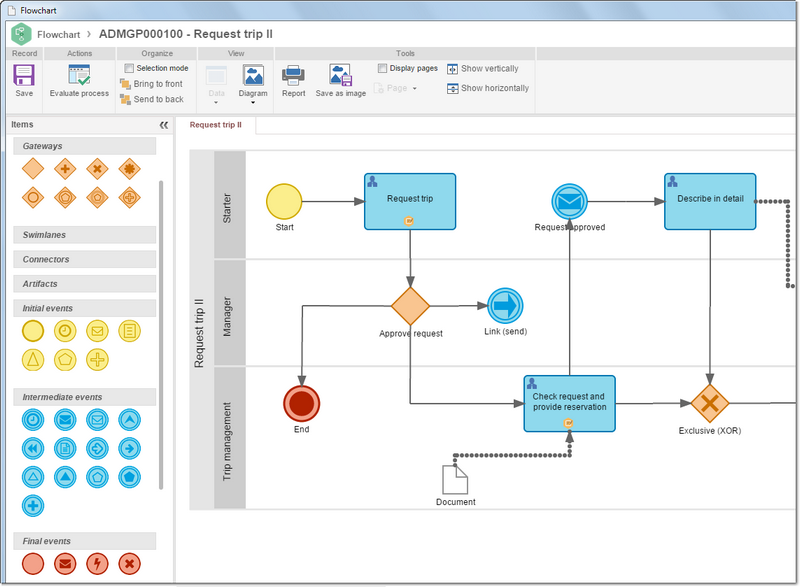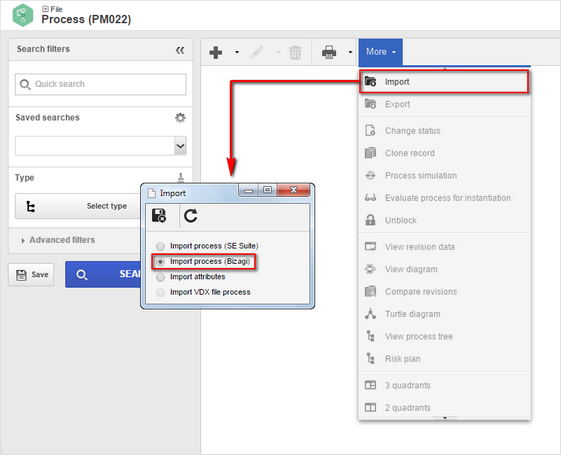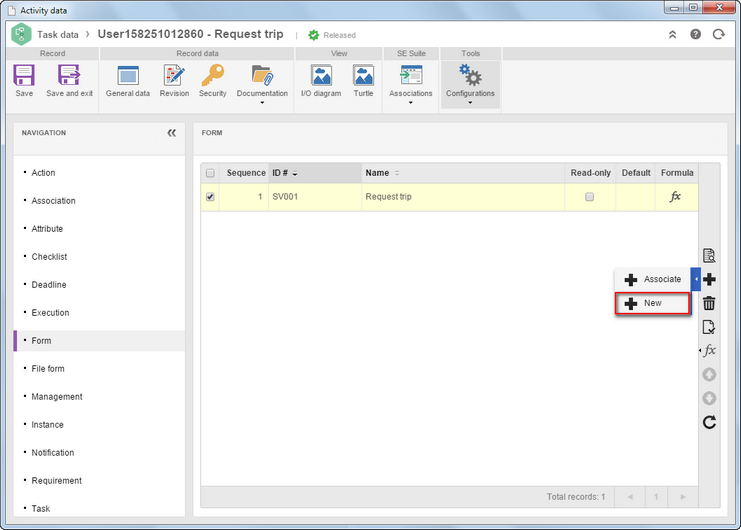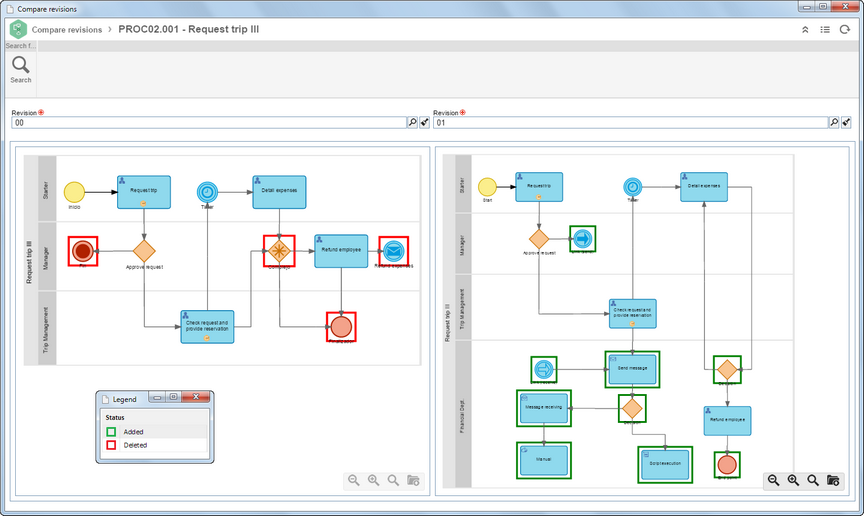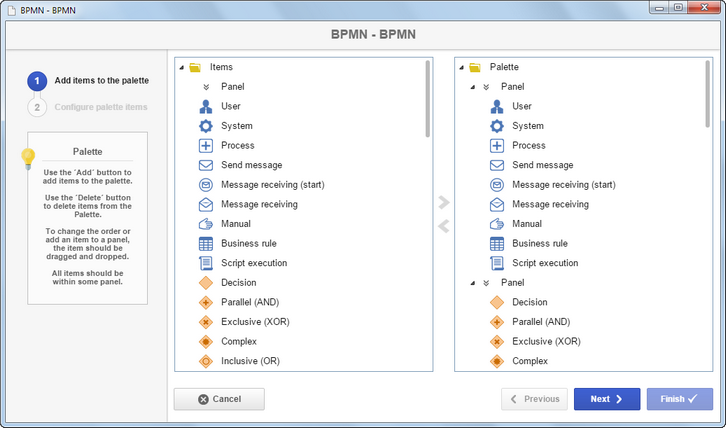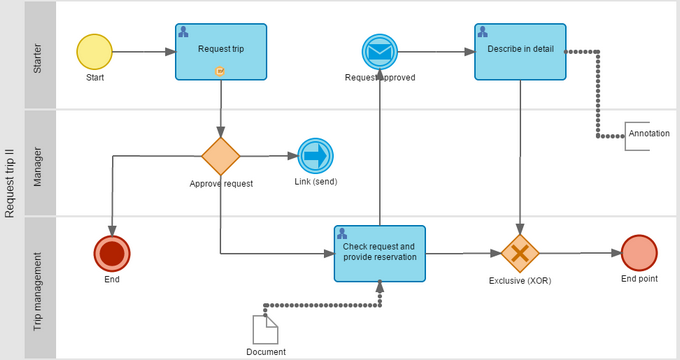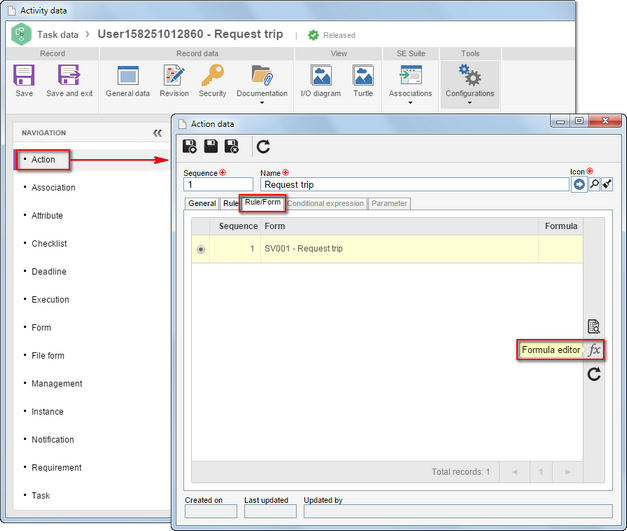
Start processes which are in "Draft" step for simulation
A new button is available in the screen of process revision tasks, which allows to start a process workflow in draft step. The goal is to allow the simulation of process automation, for business process management, from template information to the execution of process automation in SE Workflow. This is a simple and transparent procedure for the process executors.
Import a process to another existing process
A new import behavior was created, which allows to perform an import to another existing process in the process repository. To satisfy this need, an option was added to the import screen, which allows user to choose between creating a new process or using an existing process. Through this improvement, user is able to import and keep the history of revision editions, and this is turn allows better and more effective quality control of processes.
Email template with information of form fields
New functions were added to HTML template of the email for message event, which allow to search values of form fields in the same way this is done for process attributes. Through this improvement, user can send a field or list value or even a form grid (table) in the notification.
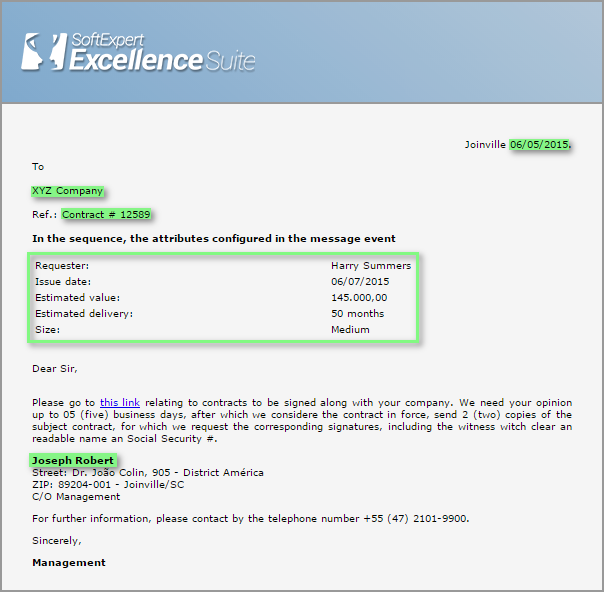
Item creation menu in process modeler
A new menu which is attached to the selected items has been developed and allows to create new items(activities) in the process modeler, connected automatically with the prior item. To use this functionality, user needs to click, drag and drop the item to the menu. The result of that improvement is a significant reduction of the time used to create the process, diminishing also the learning curve and allowing a significant increase of productivity.
Menu for flows (transitions) style edition
A new functionality was developed in process modeler, which allows user to edit flow style (connection between two items) and allows to organize process design easily and quickly. When user selects a flow, the system displays a button to open a style configuration screen. The same style can be applied to all the flows and that configuration can be maintained for new flows as well. For manual style, that allows to create line break points manually, a button that allows to perform this action was also added and user does not need to use the Mouse right button on the line.
Process data import/export
Improvement for process import, which allow to export and import process attributes, conditional expressions, formulas and forms. All complementary data of the process can be exported now, this does not need to be complemented manually. To do that, in Process registration menu new export/import options are available now.
Turtle chart was modified
A new functionality was developed for Turtle chart, which allows user to configure the components displayed in the quadrants, and enables user to show the information based on the company needs. To do so, a screen that is available in the configuration menu was created and allows user to select the item of each quadrant. This improvement can be used for the process turtle chart and also for the activities.
Turtle chart report
A new Turtle chart report was developed, according to the configured quadrants. This new report will display the process summary, the diagram design will inform the configuration and details of quadrants. A report button is available in the turtle chart.
Process single flowchart
New resources are available in single process (Basic Workflow), which allow to create the process that contains the same items that BPMN has, but without the Lanes. Thus, customers who use this simplified notation, can also use BPMN advanced resources.
Formula to load form through process activity
Starting from this version, user will be able to create a formula by process activity for each form, and will be able to apply rules in each process step. He will not need to create conditions in the form, such as, (If activity is equal to the 'First Activity', do, etc.). Thus, user will be able to manage form rules better, being able to reuse the form in other processes.
Formula to define timer duration
A new functionality was developed in Timer intermediate event, which allows user to define a rule (formula) for duration and use field form and attributes among other information, to set the process waiting time. in this new functionality, the formula should return to the same function used to define the dynamic duration of an activity.
Message event with addressee from form field
New addressee types were created in the configuration of notified users in message event. Thus, user can send notification emails to addressees that come from some form field. The email can be obtained using the user name or registration entered in the form. The email address can also be found directly in a form field.
BPMN 2.0 notation
Starting from this version, user will be able to use new BPMN 2.0 notation symbols. New types of activity, gateways, events and artifacts are available to satisfy that need. At first, some new items will not execute automation rules. They can be used for mapping and during execution in SE Workflow they advance to the next item. This new operation makes provides flexibility to BPMN and covers a wider scope, as it offers a full overview of the business process.
Viewing and modeling of processes in HTML5
Starting from this version on, the flowchart of SE Process can be viewed and edited directly in HTML 5. A new graphic tool was developed (CAFE-Canvas Flowchart Engine) which uses the latest and most functional resources. It contains advanced algorithms of artificial intelligence to help user model and browse quickly and efficiently. Thus, user does not need to use the plug-in of flash player and he is also able to use mobile devices to visualize information.
Menu to change Gateway and Events item types
A new resource is available, to enable user to change the gateway type without needing to remove and create another one. This simplifies the use of the tool and user is able to change the gateway rule quickly and objectively. The same functionality can be used for initial, intermediate and final events. A button on the left side of selected item was created to use this functionality, to open a configuration screen.
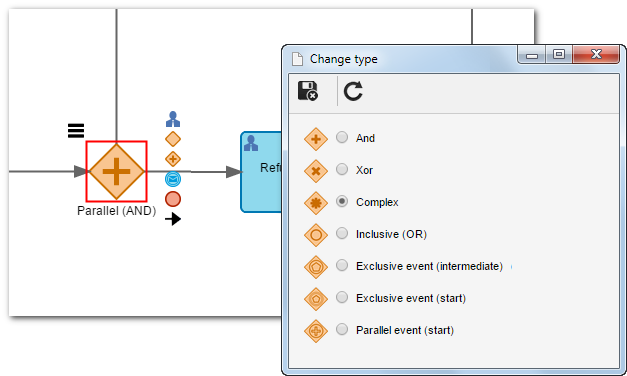
Performance was improved in process copy and revision creation
Some changes were made to the process copy and process revision creation, for better performance. An algorithm of batch record copy was created to satisfy that need.
Import processes from Bizagi (xpdl)
A new functionality was developed, which allows to import processes from Bizagi exported in XPDL. Using this resource, many customers who use Bizagi in some departments will be able to migrate to SE Process quickly and easily. Bizagi importing displays a Wizard interface that displays the process step by step until import finishes. To be able to use this resource, an option has been added to the import button.
Create a form starting from the process modeler
A new behavior in form association was created, which allows to associate an existing form and to create a new form. Customer will be able to prepare the process and create the forms horizontally, creating the process and the form in parallel. To access that functionality a new button was created in the association screen, to add forms.
Revision comparison showing the flowchart side by side-by-side
A new method to compare process revisions was developed, which allows a visual comparison showing both process flowcharts side by side. The system also flags in the process design, which activities have been added or deleted. The objective is to be able to see the changes in the process flow, for better understanding of business processes history.
Improvement for process palettes creation
New behavior was created when user registers a process modeling palette, which creates panels and items automatically, according to (BPMN, Macroprocess or Flowchart) notation. Thus, user needs only to delete or edit the items he does not wish to show and configure the symbols if this is necessary. The result is increased productivity and decrease of learning curve, allowing user to customize easily and quickly the palettes to create processes. Palette registration has been transferred to configuration menu of SE Process.
New layout for the flowchart
Some changes were made to the flowchart layout, for better visualization of items. A market research was conducted to define a clear layout which is easily understood. New colors and styles were applied to processes. Consequently, user productivity increases when he views and makes changes to the process design. The color will be maintained in those cases when the process has been customized.
Formula of SE Form for each Workflow action
A new resource was created for business rules, which enables user to define a rule for the action that executes the activity. Thar rule can verify values, inconsistencies, among other applications, in the fields. In case there are several actions, a different rule can be applied for each action. Thus, when user takes an action, he calls a formula from the form to validate inconsistencies and rules. By using this resource, the system can for example, validate the completion of some fields when he uses approval action and validate other fields when user uses reject action. To access the functionality, action data screen was modified and shows the activity forms to create the formulas.

